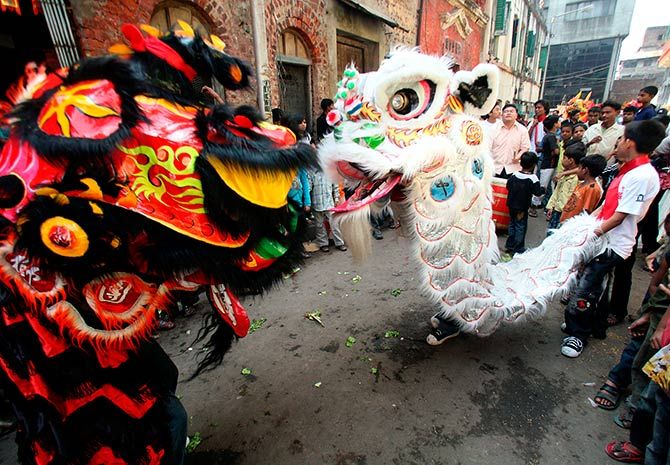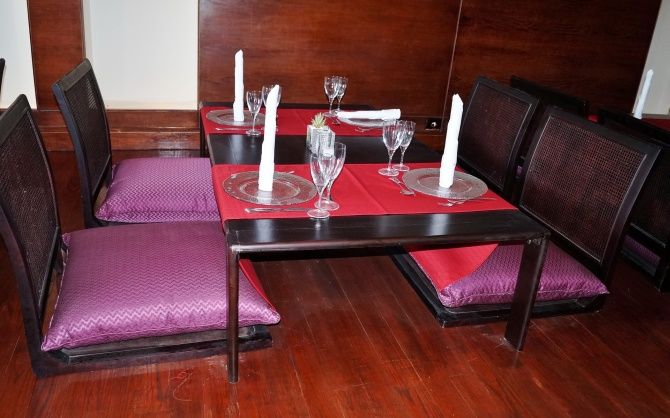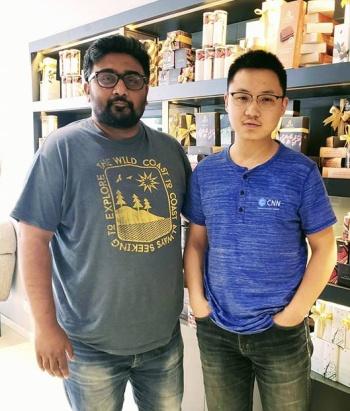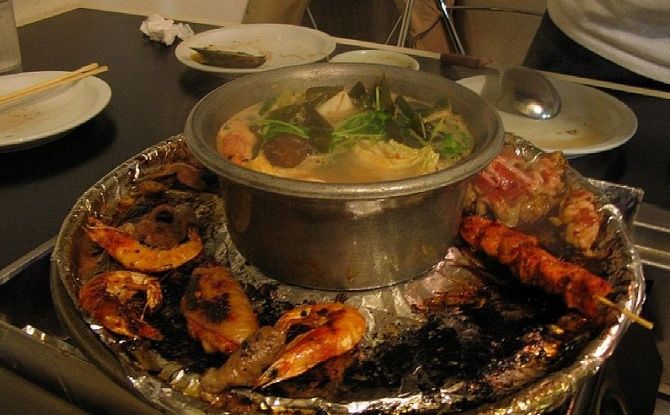 | « Back to article | Print this article |
The new entrants are young, enterprising Chinese men and women who want to tap into the promising Indian market, discovers Nikita Puri.

Every month, Qiguo Mark Su, executive chef at the Shang Palace, a Chinese restaurant at the Shangri-La Hotel in Bengaluru, imports at least 2.5 kg of Sichuan peppercorn (hua jiao) for his loyal diners.
A quite common spice in his home country, it is harder to source in India. "It is one of the ingredients that make a Chinese meal authentic," says Su, a native of China's Sichuan province.
The conversation veers towards the customs and etiquette of Chinese dining. "It isn't really part of Chinese culture to be served food. We like to do that ourselves," says Su's colleague and translator, Athena Chen, assistant manager (guest relations) at the hotel.
Behind them, a girl, barely five, is running around barefoot on the carpeted floor. She doesn't respond to English. When Chen offers her a dumpling, addressing her in Mandarin, the child perks up.
Even on a weekday, a good chunk of Su's regular guests is Chinese. Shang Palace is one of the places they frequent for authentic cuisine from their homeland, besides Memories of China (Vivanta by Taj) and a restaurant called New Leaf in Indiranagar.

"If you walk into any one of these places, you're bound to see one or more familiar face," says Junjie Li, referring to the small, well-knit community of Chinese expats in Bengaluru.
Li is the proprietor of WeCool Imports, an e-commerce start-up that specialises in electronic products. Married to an Indian from Sikkim, he is one among the growing number of Chinese who have newly made Bengaluru their home.
Li belongs to what might be termed the first generation of the second wave of Chinese immigrants in India. The population of those who came in the first wave (in the late 18th century) -- like the ones who once thrived in pockets like Kolkata's Chinatown -- is dwindling.
The new entrants are young, enterprising Chinese men and women who want to tap into the promising Indian market.
Bengaluru in Karnataka, Gurugram in Haryana, Chennai in Tamil Nadu, Sri City in Andhra Pradesh, and Mumbai and Pune in Maharashtra are some of the places they are homing in on.
If Bengaluru's tech ecosystem and weather are attractive, Andhra Pradesh's clear policies for businesses are the pull.
Today, Bengaluru has at least 500 Chinese expats who have been living here for four-odd years. In all, about 1,000 float in and out of the city for work. While Gurugram has 1,000 to 1,200 Chinese expats, a rough estimate puts Chennai's number at about 1,000.
Thanks to it being an industrial and port city, Chennai's Chinese population also features those who have interests in Andhra Pradesh, especially Sri City, a fast-growing business hub.
Overall, there are easily over 5,000 Chinese currently living in India.
Here on work and business visas, some want to make India their home for good. A few have even married Indians and taken the Overseas Citizenship of India or received 'X' visas (which allow long-term residence). Most have adapted to the needs of a growing Indian economy.

Lucy Meihan Lin, for example, landed in Bengaluru last January as the co-founder of ZanDeal, an online marketing analytics start-up. It didn't take her long to spot the huge possibilities that lay in connecting Indian start-ups with investors and partners in China.
These days, as she battles Koramangala's traffic and hops between cafés and restaurants for meetings, Lin lives out the dream of becoming a formidable foodie. "All my fat is mutton biryani fat," she declares.
The story of the Chinese in India is one that is slowly developing. It is also a quiet narrative.
This is a community that is cautious, sometimes shy, and at times constrained by language. Or, as many of them say, survivors of bad press.
"There are security concerns about our borders, issues with visas, protests against Chinese products, but really, there are far more similarities between our countries than differences," says Li Jian, the head of Gurugram-based DraPhant, a business accelerator, and founder of the ChinIndia Chamber of Commerce and Industry.
Jian initially came to Agra as an exchange student to study Hindi.
Nicknamed 'Amit' by his Hindi teacher at Peking University much before he landed in India, Jian's business consultancy DraPhant (a mashup of the Chinese dragon and Indian elephant) boasts of Chinese clients who've brought in $154 million to India.

The primary reason for the uptick in interest in India, says Forrest Chen Yukun, is because the market in China is saturated, especially for e-commerce businesses. A techie from Sichuan, Yukun sold his first company, Umeng, to Alibaba in 2013. Three years later, he landed in Delhi to start NewsDog, a Tencent-backed content aggregator app specialising in regional languages.
Yukun recently moved base to Bengaluru and says his team, especially his Chinese colleagues who often travel between the two countries, are happier here because of the weather.
Till three years ago, hordes of Chinese students would come to the city to study computer applications at Bangalore University.
"At one point we had two sections exclusively for them because we had almost 120 Chinese students," says Hemanth Uppala, head of the computer education department at Dayananda Sagar Institutions, Bengaluru.
While that trend has ebbed, some of those students have stayed on.
Gao Xiancheng, co-founder of the New Leaf restaurant, and Junjie Li of WeCool Imports are among them.
In addition to Alibaba (which has invested in Paytm) and Tencent (in Flipkart and Ola), a host of other Chinese investors with deep pockets are looking to invest in India. This includes Ganesh Ventures, an India-focused fund backed by investors from Europe, Hong Kong, Taiwan and Mainland China. It plans to invest $250 million in Indian start-ups and open offices in Gurugram, Bengaluru, Hong Kong and Beijing.
For many of the expats, India is more than just a business opportunity. The Hindi-speaking Jian, a self-confessed fan of Rani Mukerji, and his wife Feiyun Zhao had an Indian wedding ceremony two years ago.
"I have devoted my life to India and it only made sense to have Indian rituals," he says.
But understanding a foreign land's history and culture isn't always easy. One expat asks me to explain if India's caste system is as prevalent as she's been told. That conversation will take longer than a working lunch, I say.

Then there is the difference in work cultures.
"It took me some time to realise that when Indians say they'd e-mail in an hour and then didn't till a day later, that wasn't a reason to not trust them. It wasn't meant as an offence," says Charu Purohit, co-founder and director of Bengaluru-based ACN Globiz, a one-stop solution for foreign businesses looking to venture into India.
Married to an Indian from Jaipur, Purohit's birth name is Chen Ping. Her sister-in-law rechristened her Charu. Now even her Chinese contacts know her by her Indian name.
"In China we tend to do things immediately. We want everything now," says Purohit.
In a way, she says, India has taught her to relax. Purohit is also the founder of the Bangalore Chinese Chamber of Commerce, a body registered in 2016.
In the absence of an ecosystem that caters specifically to Chinese businesspeople, bodies like Jian's ChinIndia Chamber of Commerce and Industry and Purohit's Bangalore Chinese Chamber of Commerce perform important roles. The Chennai China Chamber of Commerce will be launched in a few weeks.
"We have about 50 members in Bengaluru," says Purohit. The Gurugram-based ChinIndia Chamber of Commerce and Industry has close to 300 members from across the country, but Jian says only about 20 of them are active.
"We plan vacations together almost every three months, and the get-togethers help us when we feel homesick," says Purohit. Workshops, such as those on company compliance and labour laws, are a significant function of these bodies.
Walk around Bengaluru's Diamond District, a semi-commercial, well-connected area where many expats live or have offices, and one can hear India's Goods and Services Tax being discussed in Mandarin.
"The idea is to stay updated and clear about India's laws and regulations," says Purohit. She is also part of a city-specific WeChat group of 38 Chinese women married to Indians based in Bengaluru. (WeChat is to China what WhatsApp is to India.) These groups also provide for translators.
The demand for translation services has increased over the past few years, says Nazia Vasi, founder of Inchin Closer, a Mandarin-language teaching institute in Mumbai.
When Vasi started the institute eight years ago, "people didn't know what Mandarin was," she says. "I had to market it as a Chinese language. Not anymore."
Vasi is witness to how business has brought the two countries together. Earlier, the demand was for trade documents to be translated, or for translators for Chinese delegations.
"Today, it has taken on a holistic, cross-cultural dimension," she adds, giving the example of the increasing demand for Mandarin subtitles for Bollywood movies.
Other things, too, have changed. For instance, friends from back home would initially refrain from visiting beauty parlours in India, says Purohit.
"There was always the scare of skin allergies. But now we've either become used to local products or just stick to international brands at Indian parlours."
One important thing, however, is missing: Quality Mandarin-teaching institutes for children. "It's not just about the language. We want our children to understand Chinese culture as well as Indian traditions," says Purohit, a mother of two.
So, unless one of the parents is Indian, the children typically live and study in China.
Purohit is keen that the two countries understand each other better. So, she is launching a Chinese app that will, through videos, document a Hindi tutor coaching her. It will also have her reading from Indian news portals to give her audience an "unbiased and clear" understanding of India.
"The media on either side don't provide 'good' communication about the other country," says Jian who backs multiple media platforms in the hope of fostering openness and communication.
Iamwire and Entrackr, Chindia Guru and Zhudao are some of these platforms. While Entrackr, an English-language platform, focuses on tech- and startup-based stories from both countries, Chindia Guru offers Chinese content on Indian subjects such as Indian street food, mangoes and even boat rides on Kashmir's Dal Lake.

Away from these concerns, Lin, Bengaluru's unofficial Chinese food guide, directs me to New Leaf.
Xiancheng, the restaurant's co-founder, describes the place as a "spice paradise" because of its traditional hotpot offering.
"Half of our clientele is Chinese, but we are increasingly getting guests from Korea and Japan as well," he says. "We also have lots of Indian hotpot lovers."
The tables are designed to support a hotpot setup where the soup boils in front of you.
At one table is a group of three-four Indian kids, all under 10. "Don't put your hands in there," says the young Kannadiga woman accompanying them.
At an adjoining table is a Mandarin-speaking family, comfortably dipping chopsticks into the hotpot and picking out the meat and veggies. Pork, fish, mutton, octopus, squid, shiitake mushroom, kelp, tofu, black fungus, sweet potato and carrots, all get cooked flavourfully in the soup.
"I wish I had discovered hotpot earlier," an Indian guest tells me.
Meanwhile, as he polishes off a plate of appam and fish curry at a Kerala restaurant, Yukun says the dishes remind him of home.
Perhaps, as Jian says, we really are more alike than we think.